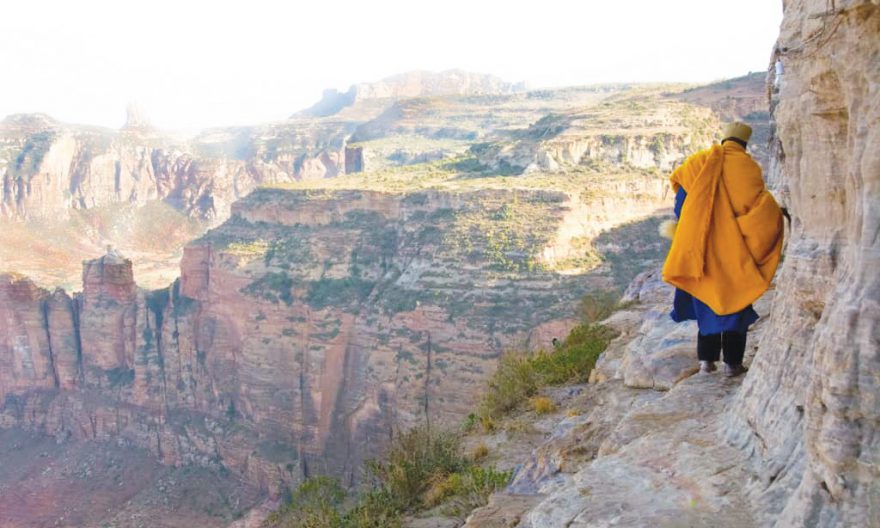
COMPLIED BY STAFF REPORTER
Are you curious about Ethiopia; and what you might experience there? Daniel Noll and Audrey Scott, Americans husband and wife, adventurers, storytellers, tourism advisors, based in Berlin ask.
The couples, after visiting the country some months ago and understand the reality on the ground, they reflected what they witnessed about Ethiopia.
From its ancient history and rock-hewn churches of Lalibela to its mountains, bustling markets, delicious cuisine, coffee ceremonies and more, there are a number of reasons why you should travel to Ethiopia. “We are almost certain you will be surprised by what you find,” the couples opined excitedly.
This is Ethiopia, Yes and a land of many surprises, they remarked.
When I was growing up, I remember Ethiopia having a long run on the nightly news. Unfortunately, newscasts all pointed to the grim. Newsreel images featured fly-ridden babies with distended bellies, drought-ruined landscapes and a ravaging famine made only worse by civil war.
Prior to our visit, we figured some distance between the Ethiopia of the 1980s and the Ethiopia of today — yet not quite to the extent we had found. If our Ethiopia travels proved nothing else, it proved this: though countries remain themselves at heart, they can emerge from perilous circumstances. When they do, stereotypes can slowly be cast aside and the historical, cultural and natural contours – which had always existed yet never been highlighted – can more clearly be revealed, they remarked.
As we shared photos of unexpected castles, remarkable mountain landscapes,
ancient churches and colorful plates of local food during our trip, readers would ask: “Is that really Ethiopia?” and the answer is, ‘YES IT IS’.”
Before our trip to Ethiopia, we were aware in a book sense that it was one of the earliest nations to adopt Christianity (in 330 A.D.). We did not imagine how pervasive and well-documented this historical vein would be, nor could we appreciate how much the country’s present would be connected with its past through ritual.
Whether they are rock-hewn or tucked far into the hills, Ethiopia’s churches often feature original paintings and frescoes from as much as 1000 years ago or more. Ancient texts and relics remain in use by today’s priests who bless all those willing by rubbing large ancient metal crosses over afflicted areas of the body.
In the Gheralta Mountains of Tigray State, churches were carved out of natural mountaintop caves as long ago as the fourth century. Why build so? The idea: hide your churches from invading armies while bringing yourself that much closer to heaven.
Climbs were steep then, just as they are now — even for young mothers who carry 40-day old babies on their backs in hopes of peak baptism.
As we followed a 78-year old monk around a cliff’s edge to the 6th century cave church of Daniel Korkor, we could imagine a staggered line of devout Ethiopians making that same journey, wrapped in the same white cotton cloth, over the course of hundreds of years.
Ethiopia feels very much like a case study in living history. An experience that is as much about feeling energy as it is about seeing the relics and remnants of an ancient history.
So much of Ethiopia’s identity is connected to its history, a history passed on orally which traces its roots back four thousand years to the Queen of Sheba, King Solomon and the Ark of the Covenant. For over a thousand years, Ethiopian kings claimed to be direct descendants of the line of Solomon, living connections between their country, its history, and the Holy Land.
Amidst all that, stories and legends circulate in a fog akin to a long-running historical version of the telephone game. Historians may argue as to the validity of any and all prevailing accounts, but as our guide suggested, “If you believe, then it is true to you. Belief, it seems, trumps all, the couples added.
Until this visit, we never really considered Ethiopia for trekking and adventure, but our experiences in the Simien Mountains and Gheralta Mountains of Tigray set that straight.
Some of our most enjoyable moments and context was the Gheralta Mountains near the town of Hawzia in Ethiopia’s Tigray State. Not only does the area surprise and stun with its Utah-reminiscent red rock backdrop and outcroppings, but treks to 1500-year old cave churches like Maryam Korkor and Daniel Korkor leave no adrenaline untapped as they force challenging climbs up sheer sandstone walls and precarious walks along narrow cliffs.
Not for the faint of heart or for those unwilling to press deeply into their fear of heights.
In and around the ancient sites that make up the modern day northern town of Aksum, stone tablets dating back thousands of years will often be inscribed in three languages: Greek, Arabic, and Ge’ez, an ancient Semitic language that predates Ethiopia’s present-day regional languages. Giant stone obelisks stand, lean and have fallen. While most recognize the ancient civilizations of Egypt, Persia, Rome and Greece among the greats, few know of the similarly advanced Aksumite Civilization which made its name in trade across the Middle East, Mediterranean and Asia from 400 B.C. to 800 A.D.
Thanks to Ge’ez, a long-standing written language, that we now know so much about Ethiopia’s past.
All monks and priests are required to learn Ge’ez and services are still held in this ancient language. In the early hours of the morning, Ge’ez chants and melodies echo through the hills.
With over 200 symbols, Ge’ez– mesmerizing spaghetti of symbols to the uninitiated — now serves as the phonetic alphabet for Amharic, the official language of Ethiopia.
True, Ethiopia is a unique and mysterious country that is branded for its heterogeneous, fascinating incredible and untapped heritages, outlived history, distinct national identities, rites and dynamic landscapes on earth. These endowments are truly exciting and breathtaking by themselves. Visiting the country, unquestionably, would offer enjoyable and unforgettable lifetime experiences.
The Ethiopian Herald 20 April 2021




